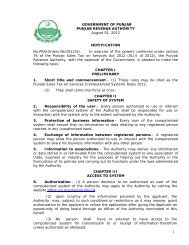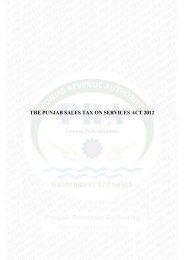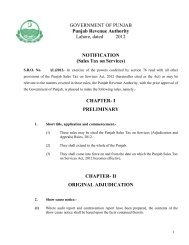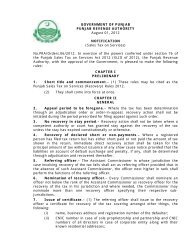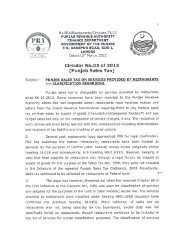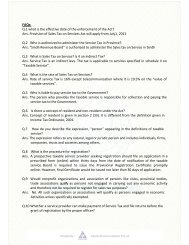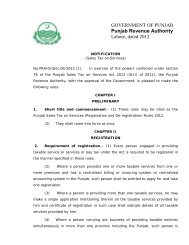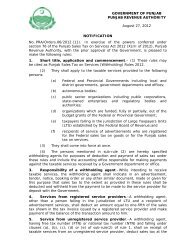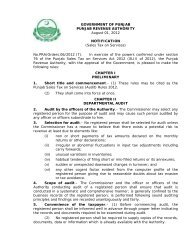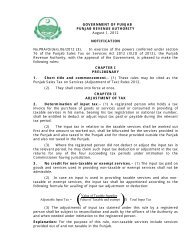Chapter I- PRELIMINARY - PRA - Punjab
Chapter I- PRELIMINARY - PRA - Punjab
Chapter I- PRELIMINARY - PRA - Punjab
You also want an ePaper? Increase the reach of your titles
YUMPU automatically turns print PDFs into web optimized ePapers that Google loves.
THE PUNJAB SALES TAXONSERVICES ACT 2012
(7) “Banking company” means a banking company as defined in the Banking CompaniesOrdinance, 1962 (LVII of 1962) and includes any body corporate which transacts the businessof banking in the <strong>Punjab</strong>;(8) “Commissioner” means a person appointed as Commissioner of the Authority;(9) “Commissioner (Appeals)” means a person appointed as Commissioner (Appeals) of theAuthority;(10) “Common taxpayer identification number” means the registration number or any other numberor identification code allocated to a registered person;(11) “Company” means–(a) a company as defined in the Companies Ordinance, 1984 (XLVII of 1984);(b) a body corporate formed by or under any law;(c) a modarba and any other Islamic financial institution;(d) a body incorporated outside Pakistan;(e) a trust, a co-operative society or a finance society or any other society established orconstituted by or under any law; or(f) a foreign association, whether incorporated or not, which the Authority has, by general orspecial order, declared to be a company for purposes of the Act;(12) “Computerized system” means any comprehensive information technology system, includingits development, up gradation or updation, to be used by the Authority or any other office asmay be notified by the Authority, for carrying out the purposes of the Act;(13) “Default surcharge” means the default surcharge levied under the Act;(14) “Defaulter” means a person and, in the case of company or firm, every director of the companyor partner of the firm and includes guarantors or successors, who fail to pay the arrears of taxunder the Act and the rules;(15) “Deputy Commissioner” means a person appointed as a Deputy Commissioner of theAuthority;(16) “Document” includes any electronic data, computer programmes, computer tapes, computerdisks, micro-films or any other medium or mode for the storage or conveyance of such data;(17) “due date” in relation to the furnishing of a return under <strong>Chapter</strong> VI means the 15th day of themonth following the end of the tax period, or such other date as the Authority may, bynotification in the official Gazette, specify;(18) “Economic activity” shall have the meaning given to it in section 6;(19) “e-intermediary” means a person appointed as e-intermediary under the Act;(20) “Exempt service” means a service which is exempt from the tax under section 12;(21) “FBR” means the Federal Board of Revenue established under the Federal Board of RevenueAct, 2007;(22) “Financial year” means the period from 1 st July of a year to 30 th June of the following year;(23) “Firm” means the relation between persons who have agreed to share the profits of a businesscarried on by all or any of them acting for all;(24) “Goods” include every kind of movable property other than actionable claims, money, stocks,shares and securities but does not include a service defined under the Act;(25) “Government” means Government of the <strong>Punjab</strong>;(26) “Inter-bank rate” means the Karachi inter-bank offered rate prevalent on the first day of eachquarter of a financial year;(27) “Officer of the Authority” means any officer of the Authority;(28) “Open market price” shall have the meaning as given to it in section 8;(29) “Person” means–(a) an individual;(b) a company;(c) Federal Government;(d) a Provincial Government;(e) a local authority or local government; or(f) a foreign government, a political subdivision of a foreign government, or publicinternational organization;Page | 2
Explanation.– The use of the word “he” in the Act shall be taken to refer to any or allmentioned from (a) to (f) as required in the context of the relevant provision;(30) “Place of business” means that a person–(a) owns, rents, shares or in any other manner occupies a space in the <strong>Punjab</strong> from where he carrieson an economic activity whether wholly or partially; or(b) Carries on an economic activity whether wholly or partially through any other person suchas an agent, associate, franchise, branch, office, or otherwise in the <strong>Punjab</strong> but does notinclude a liaison office;(31) “Prescribed” means prescribed by the rules;(32) “Registration number” means the number allocated to a registered person for purposes of theAct;(33) “registered person” means a person who is registered or is liable to be registered under the Actbut the person liable to be registered and has not registered shall not be entitled to any benefitavailable to a registered person under any of the provisions of the Act or the rules;(34) “Return” means any return required to be furnished under <strong>Chapter</strong> VI of the Act;(35) “Resident” means–(a) An individual who, in a financial year, has–(i)a place of business, whole or part thereof, in the <strong>Punjab</strong> in any mode, style or manner;or(ii) his permanent address, as listed in the individual’s national identity card, in the<strong>Punjab</strong>; or(iii) a permanent representative to act on his behalf or to provide service on his behalf inthe <strong>Punjab</strong>.(b) An association of persons or a company which, in a financial year, has–(i) Its registered office in the <strong>Punjab</strong>; or(ii) Its place of business, whole or part thereof, in the <strong>Punjab</strong> in any mode, style ormanner; or(iii) A permanent representative to act on its behalf or to provide service on its behalf inthe <strong>Punjab</strong>; or(iv) The control or management of the affairs of the association of persons is situated in the<strong>Punjab</strong> at any time during the financial year;(36) “Rules” means the rules made under the Act;(37) “Schedule” means a Schedule appended to the Act;(38) “Service” or “services” means anything which is not goods or providing of which is not asupply of goods and shall include but not limited to the services listed in First Schedule;Explanation.– A service shall remain and continue to be treated as service regardless whether or notrendering thereof involves any use, supply or consumption of any goods either as an essential or as anincidental aspect of such rendering;(39) “short-paid” means where a registered person pays an amount of tax less than the tax dueowing to miscalculation or incorrect assessment of the tax amount due for a tax period;(40) “Similar service” means any other service which is the same as, or closely resembles with, theother service in character, quality, quantity, functionality, materials, or reputation;(41) “Special Judge” means a Special Judge appointed under section 42;(42) “Tax” means and includes–(a) The tax, additional tax, or default surcharge levied under the Act;(b) A fine, penalty or fee imposed or charged under the Act; and(c) Any other sum payable or recoverable under the Act or rules;(43) “Tax fraud” means knowingly, dishonestly or fraudulently and without any lawful excuse–(a) Doing of any act or causing to do any act; or(b) Omitting to take any action or causing the omission of any action, including providing oftaxable services without being registered under the Act; or(c) Falsifying or causing falsification of tax invoices or other tax documents or records; orPage | 3
(d) Acting in contravention of the duties or obligations imposed under the Act or rules orinstructions issued thereunder – with the intention of understating or suppressing the taxliability or underpaying the tax liability;(44) “Tax period” means a period of one month or such other period as the Authority may, bynotification in the official Gazette, specify;(45) “Taxable service” shall have the meaning as given to it in section 3; and(46) “Value of a taxable service” shall have the meaning as given to it in section 7.3. Taxable service.– (1) Subject to such exclusion as mentioned in Second Schedule, a taxable serviceis a service listed in Second Schedule, which is provided by a person from his office or place ofbusiness in the <strong>Punjab</strong> in the course of an economic activity, including the commencement ortermination of the activity.Explanation.– This sub-section deals with services provided by a person regardless whether suchservices are provided to a resident person or a non-resident person.(2) If a service listed in Second Schedule is provided to a resident person by a non-residentperson in the course of an economic activity, including the commencement or termination of theactivity, it shall be treated as a taxable service.Explanation.– This sub-section deals with services provided by a non-resident person to a residentperson whether or not the end consumers, if any, of such services are identifiable for purposes of thisAct or the rules.(3) For purposes of sub-section (2), where a person has a registered office or place of business in the<strong>Punjab</strong> and another outside the <strong>Punjab</strong>, the registered office or place of business in the <strong>Punjab</strong> and thatoutside the <strong>Punjab</strong> shall be treated as separate legal persons.(4) The Authority may, with prior approval of the Government, by notification in the officialGazette, prescribe rules for determining the conditions under which a particular service orclass of service shall be considered to have been provided by a person from his registeredoffice or place of business in the <strong>Punjab</strong>.(5) For purposes of this Act and the rules, providing of service shall, where the context so requires,include rendering, supply, initiation, origination, execution, reception, consumption ortermination of a service whether in whole or in part.4. Application of principles of origin and reverse charge in certain situations.– (1) Where a person isproviding taxable services in a Province other than the <strong>Punjab</strong> but the recipient of such services is resident ofthe <strong>Punjab</strong> or is otherwise availing such services in the <strong>Punjab</strong> and has charged tax accordingly, the personproviding such services shall pay the amount of tax so charged to the Government.(2) Where the recipient of a taxable service is a person registered under the Act, he shall deduct the wholeamount of tax in respect of the service received and pay the same with the Government.(3) Where a person is providing taxable services in more than one Province or territory in Pakistanincluding the <strong>Punjab</strong>, such person shall be liable to pay tax to the Government to the extent the tax ischarged from a person resident in the <strong>Punjab</strong> or from a person who is otherwise availing such servicesin the <strong>Punjab</strong>.(4) Where rendering of a taxable service originates from the <strong>Punjab</strong> but terminates outside Pakistan, suchperson shall be required to pay tax on such service to the Government.(5) Where a taxable service originates from outside Pakistan but is received or terminates in the <strong>Punjab</strong>,the recipient of such service shall be liable to pay the tax to the Government.(6) The persons who are required to pay the tax to the Government in terms of sub-sections (1), (2), (3),(4) and (5) shall be liable to registration for purposes of this Act and the rules.(7) All questions or disputes relating to the application of the principle of origin given in this section shallbe resolved in terms of the already recorded understanding between the Federal Government and thePage | 4
Provincial Governments on the implementation of reformed General Sales Tax provided thatpendency of any such question or dispute shall not absolve the concerned person from his obligationto deposit the tax.(8) The provisions of this section shall apply notwithstanding any other provision of this Act or the rulesand the Government may specify special procedure to regulate the provisions of this section.5. Amendment in Second Schedule.– (1) The Government may, by notification in the official Gazette, make anamendment in Second Schedule by modifying, adding or deleting any entry or entries with reference to theclassification, if any, description of any service or class of services and the rate or rates of tax chargeable onany service or class of services not exceeding the maximum rate prescribed in Second Schedule.(2) A notification issued under sub-section (1) shall be effective from such date as may be specified in thenotification but such date shall not be prior to the date on which the notification is published in theofficial Gazette.(3) The Government shall at the time of presenting the Annual Budget Statement for the next financial year,lay before the Provincial Assembly of the <strong>Punjab</strong> all the notifications relating to the amendments in theSecond Schedule during the current financial year.6. Economic activity.– (1) An economic activity means any activity carried on whether continuously,regularly or otherwise by a person that involves or is intended to involve the provision of services toanother person and includes–(a) an activity carried on in the form of a business, including a profession, calling, trade, or undertakingof any kind, whether or not the activity is undertaken for any consideration or profit;(b) the supply of movable property by way of lease, license or such similar arrangement; and(c) a one-time transaction or concern in the nature of a business or trade.(2) Anything done or undertaken during the commencement or termination of an economicactivity shall be construed as part of the economic activity.(3) An economic activity does not include–(a) the activities of an employee providing services in that capacity to an employer; or(b) a private recreational pursuit or hobby of an individual.7. Value of a taxable service.– (1) The value of a taxable service is the consideration (by whatevername called such as charges or price) in money including all the Federal and the Provincial duties,taxes or charges, if any, which the person providing a service receives from the recipient of theservice but does not include the amount of the tax.(2) In case the consideration for a service is in kind or is partly in kind and partly in money, thevalue of the service shall mean the open market price of the service as determined undersection 8 excluding the amount of the tax.(3) In case the person who provides the service and the recipient of the service are associatedpersons and the service is supplied for no consideration or for a consideration which is lowerthan the price at which the person provides the service to other persons who are not associatedpersons, the value of the service shall mean the price at which the service is provided to suchother persons but does not include the tax.(4) In case a person provides a service for no consideration or for a consideration which is lowerthan the price at which such a service is provided by such person, the value of the serviceshall mean the open market price for such a service.(5) In case of trade discounts, the value of the service shall mean the discounted price, excludingthe amount of the tax, provided the invoice shows that the discounted price and the relatedtax and the discount allowed is in conformity with customary business practice.Page | 5
(6) In case there is reason to believe that the value of a service has not been correctly declared inthe invoice or for any special nature of transaction it is difficult to ascertain the value of aservice, the value of the service shall be the open market price.(7) Notwithstanding anything in sub-sections (1) to (6), where the Authority deems it necessary,it may, by notification in the official Gazette, fix the value of any service or class of servicesand for that purpose fix different values for different classes or descriptions of the same orsimilar types of services but if the value at which the service is provided is higher than thevalue fixed by the Authority, the value of the service shall, unless otherwise directed by theAuthority, be the value at which the service is provided.Explanation.– For the purpose of this section, the value of the utilities or facilities, if any, ancillaryto providing of taxable services shall be included in the value of such services.(8) The Authority may, by notification in the official Gazette, issue valuation rules for anyservice or class of services for purposes of assessment or determination and payment of taxunder this Act and prescribe threshold, parameters, standards, methods, formula, criteria orbases for the determination of value of any taxable service or class of taxable services and theassessment of the tax on any service or class of services.8. Open market price.– (1) The open market price of a service is–(a) The price, the service would fetch in an open market transaction freely entered into between personswho are not associated persons; or(b) if it is not possible to determine an amount under paragraph (a), the price a similar service wouldfetch in an open market transaction freely made between persons who are not associated persons,adjusted to take account of the differences between the similar service and the actual service,(c) Determined on the basis of the market conditions prevailing at the time and place at which theservice is provided.(2) If the open market price of a service cannot be determined under sub-section (1), it may bedetermined by using any method or formula specified by the Authority for calculating an objectiveapproximation of the price, the service would fetch in an open market transaction freely madebetween persons who are not associates.9. Provision of services over a period of time.– (1) Where a service is provided over a period of timeand payment for the same is made on a periodic basis, the service shall be treated as comprising two ormore separate and distinct services each corresponding to the part of the service to which each separatepart of the consideration relates.ILLUSTRATIONS(a) Where services are provided for a two year period and payment is made on a semi-annual basis, theprovision of services for each six month period constitutes a separate service.(b) Where an insurance company provides an insurance policy over a five year period and receives apremium on an annual basis, each premium relates to a separate service.Note: The above illustrations are merely explanatory and shall not be construed as conclusive in anymanner whatsoever.(2) This section does not apply to services for which payment is made on installments basis.Page | 6



